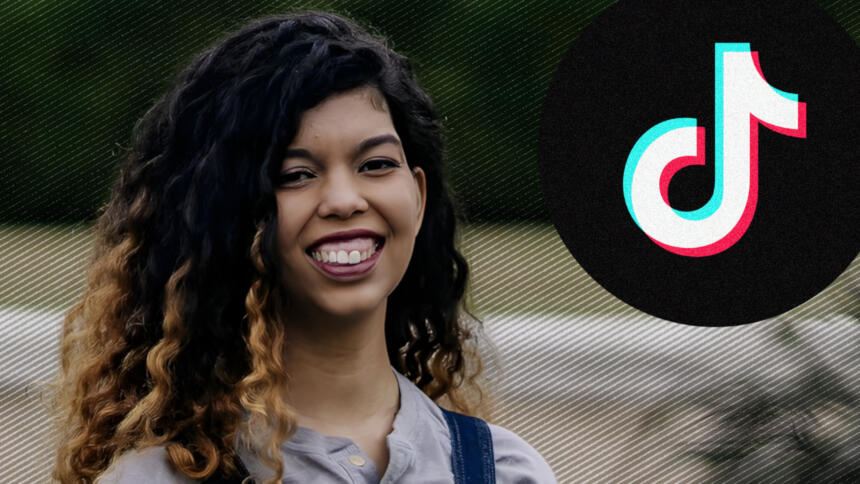Within a few years, TikTok has become one of the most influential social media platforms in the world. If TikTok changes its rules or tweaks its features, it affects millions of people. However, there is little discussion about behind-the-scenes decisions at TikTok. US-creator Amelia Som and a group of volunteers want to change that.
The Online Creators‘ Association (TOCA) was founded in July 2020 and sees itself as a lobby for creators. With the help of manually submitted reports and a community on Discord, TOCA gathers knowledge about problems on TikTok and proposes solutions.
For years, journalists and NGOs have been denouncing problems on TikTok as well. The accusations included discriminatory content moderation, non-transparent rules, censorship and close ties to authoritarian China. In the interview, TOCA-member Amelia Som explains what creators think is wrong with TikTok – and why she believes TikTok is downplaying its power. The interview was also published in German.
netzpolitik:org: Amelia, which role does TikTok play in your life?
Amelia Som: TikTok kept me sane during the pandemic. In quarantine, I wanted to connect with other people. One of the best things about TikTok is the ability to find and build community with people who share your interests. In my case, that was a community of queer people of color interested in tabletop games like „Dungeons and Dragons.“ I haven’t met as many queer black nerds in my life as I have on TikTok. When you live in Oklahoma, it’s hard to make those kinds of connections.
netzpolitik:org: What does it mean to you to live in Oklahoma?
Amelia Som: Tulsa, Oklahoma is the second largest city in Oklahoma, and probably one of the most liberal areas of the state. That being said, Oklahoma is still a very conservative, very white state. I didn’t even „come out“ until I had already graduated college. I’m 24 now. So there have been efforts to be welcoming to the queer community, especially in the past several years, but there’s still this kind of fear in general spaces of safety and acceptance.
Finding and building community as an adult is already difficult in a place that is so suburban and car-centric. It’s hard to connect with other black queer people, at all! I didn’t have to come out online, I could just be out to begin with. One of the amazing things about building community on TikTok was that it connected me to tons of other people, especially black queer gamers, who were just looking for a place to belong. But every rose on TikTok has its thorns.
„Faulty communication“
netzpolitik:org: What has TikTok done wrong that creators are joining together in an alliance?
Amelia Som: TikTok is a dopamine lottery. You can gather a lot of followers with little production effort – but then from one day to the next your videos can plummet in views. That’s incredibly discouraging and plunges you into self-doubt. There are algorithmic and economic forces at work that most creators don’t understand, whether or not they are working in your favor.
TikTok’s biggest problem is faulty communication. We believe TikTok internally flags accounts it deems problematic for ads. But affected people have no way of knowing. There is no notification, no public set of rules. I know creators with thousands of followers whose videos suddenly drop to only a few hundred views. Then they create a new account, upload the same kinds of videos and get significantly more views. Those are the kinds of issues we’ve noticed in TOCA.
netzpolitik:org: What exactly does TOCA’s day-to-day work look like?
Amelia Som: Our Discord server has about 1,000 members. For some, it’s a place to vent and talk about problems, for others it’s a place to help us aggregate data about creator experiences. From the outside, TikTok is a black box. We want to quantify the anecdotal experiences of creators to better understand the processes that lead to them. We’ve had the ability to work with Arizona State University’s Lincoln Center of Applied Ethics to host panel discussions with TikTok creators and look at avenues to further develop our research capabilities.
„Hate speech if you call someone a Nazi“
netzpolitik:org: How do you find agreements at TOCA?
Amelia Som: TOCA is comprised entirely of volunteers. While anyone on our discord server has the ability to share thoughts about their experiences or pose questions to our administrative team, we also encourage those who wish to step up into more active roles to pursue roles for example as moderators. The people who have worked to develop our goals and the shape of our organization have always been the people who wanted to spend the time to do so.
netzpolitik:org: On your Discord server there are separate rooms for Black and Jewish creators and for creators with disabilities. Does TikTok’s behavior hit these groups particularly hard?
Amelia Som: Yes, in many different ways. Like, for people with hearing disabilities, automatically generated captions are necessary to use the app. But the way TikTok introduces these features has been unacceptable. For a long time, it was the responsibility of the creator to manually add captions with text stickers on top of their videos. Eventually, some creators suddenly could generate automatic captions, but others could not. At the same time, only some viewers could see these captions, but others could not. It doesn’t make sense to distribute them randomly and without notice.
Marginalized groups each have unique but similar problems: Their videos are sometimes blocked when they speak out against discrimination. For example, Black creators have said the N-word and TikTok has flagged their videos for „hate speech.“ Your video can also be deleted for „hate speech“ if you call someone a Nazi for promoting White Supremacy. There have been cases where Jewish creators have called out anti-Semitic statements and were punished for „harassment and bullying“ while the original statements were left alone.
Often, many of these community guidelines violations are reversed when the targeted user appeals the ruling, but there is no clear guidance on the timeline of the process, how it affects your account, and how to prevent it from happening again.
„We want transparency“
netzpolitik:org: TikTok makes a public effort to promote diversity, for example by presenting queer and female creators.
Amelia Som: This is good, but not enough. As a Black, queer, femme-presenting creator, it doesn’t impress me much when TikTok showcases a few hand-picked accounts once a year while thousands have a shitty time. The people who run TikTok shape a sizable portion of pop culture, and I’m sure they leverage huge influence to their investors. A multi-billion dollar corporation should offer more than a few marketing campaigns as the solution to an app-wide moderation issue. TikTok can’t simultaneously be a juggernaut of pop culture while also being powerless to fix the culture it purportedly defines.
netzpolitik:org: What are TOCA’s demands for TikTok?
Amelia Som: First and foremost, we want transparency, especially when it comes to content moderation. Which things always go under review, which things are triggered by user reports? When is content reviewed by algorithms versus actual humans? How are these humans trained and what rules apply to our content? The terms of service are incredibly vague, what judgements are made in those gray areas?
We also demand more features that make TikTok more accessible for people with visual impairments and clearly communicate these changes and accessibility improvements as they happen. In addition, TikTok disproportionately punishes sex workers, even if they only allude to their career or direct people to another site. There should be better child safety measures to allow accounts to restrict their content instead of punishing people whose livelihood depends on social media. I’ve probably forgotten something, but our full list of demands is on our site.
„TikTok likes to downplay its own influence“
netzpolitik:org: Does TikTok have a special role because the parent company Bytedance comes from China, an authoritarian regime?
Amelia Som: I don’t think so. Facebook, Instagram and YouTube come from the US, a patriarchal, white-supremacist state. All corporations are terrible in their own way. I notice that unlike Facebook, TikTok is more modest, in a way. I think TikTok likes to downplay its own influence in order to be held less accountable in the public eye. But social media influences every aspect of our lives. It determines what content everyone is talking about. It’s not too much to ask that the people behind it be held accountable for their role in shaping it.
netzpolitik:org: How is TikTok responding to your demands?
Amelia Som: TikTok follows one of our co-founders on Instagram. So they know we exist. But have so far ignored us. Maybe they do that so they don’t have to promise anything in response. I think TikTok sees its creators not as an investment, but as a resource to exploit. For every creator that leaves TikTok, there are several new ones coming in. That works for a while, but it’s unsustainable. Without creators, TikTok wouldn’t exist. Then maybe they would pay people for the content they now get for free.





0 Ergänzungen
Dieser Artikel ist älter als ein Jahr, daher sind die Ergänzungen geschlossen.